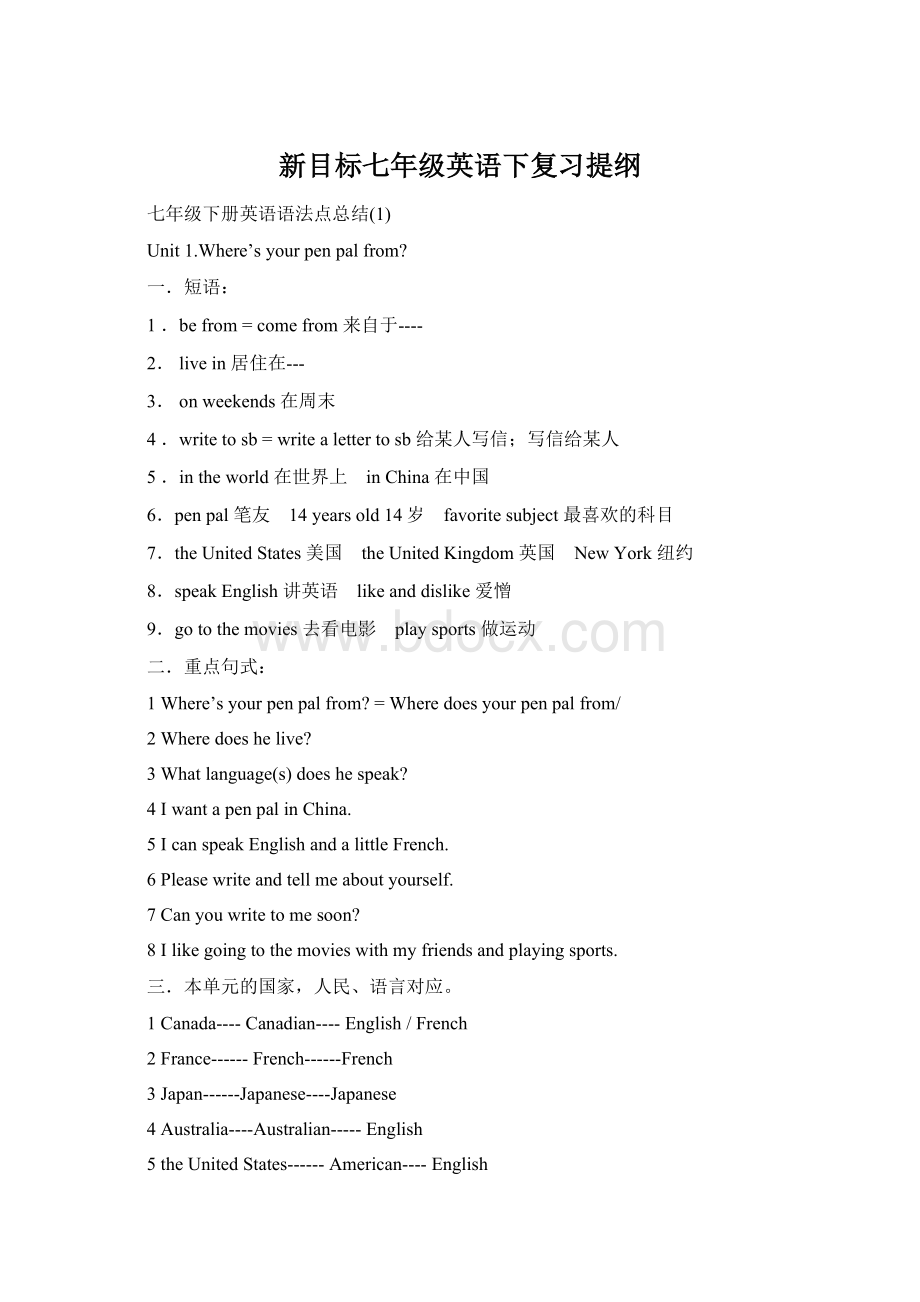新目标七年级英语下复习提纲.docx
《新目标七年级英语下复习提纲.docx》由会员分享,可在线阅读,更多相关《新目标七年级英语下复习提纲.docx(24页珍藏版)》请在冰豆网上搜索。

新目标七年级英语下复习提纲
七年级下册英语语法点总结
(1)
Unit1.Where’syourpenpalfrom?
一.短语:
1.befrom=comefrom 来自于----
2.livein居住在---
3.onweekends在周末
4.writetosb=writealettertosb给某人写信;写信给某人
5.intheworld在世界上 inChina 在中国
6.penpal 笔友 14yearsold 14岁 favoritesubject最喜欢的科目
7.theUnitedStates美国 theUnitedKingdom英国 NewYork纽约
8.speakEnglish讲英语 likeanddislike爱憎
9.gotothemovies去看电影 playsports做运动
二.重点句式:
1Where’syourpenpalfrom?
=Wheredoesyourpenpalfrom/
2Wheredoeshelive?
3Whatlanguage(s)doeshespeak?
4IwantapenpalinChina.
5IcanspeakEnglishandalittleFrench.
6Pleasewriteandtellmeaboutyourself.
7Canyouwritetomesoon?
8Ilikegoingtothemovieswithmyfriendsandplayingsports.
三.本单元的国家,人民、语言对应。
1Canada----Canadian----English/French
2France------French------French
3Japan------Japanese----Japanese
4Australia----Australian-----English
5theUnitedStates------American----English
6theUnitedKingdom---British-----Enghish
Unit2.Where’sthepostoffice?
一. Askingways:
(问路)
1. Whereis(thenearest)……?
(最近的)……在哪里?
2. Canyoutellmethewayto……?
你能告诉我去……的路吗?
3. HowcanIgetto……?
我怎样到达……呢?
4. Isthere……nearhere/intheneighborhood?
附近有……吗?
5. Whichisthewayto……?
哪条是去……的路?
二.Showingtheways:
(指路)
1.Gostraightdown/alongthisstreet. 沿着这条街一直走。
2.Turnleftatthesecondturning. 在第二个路口向左转。
3.Youwillfinditonyourright. 你会在你右手边发现它。
4.Itisaboutonehundredmetresfromhere. 离这里大约一百米远。
5.You’dbettertakeabus. 你最好坐公交车去。
(You’dbetter+动词原形)
三.词组
1.acrossfrom…… 在……的对面 acrossfromthebank 在银行的对面
2.nextto…… 紧靠…… nexttothesupermarket 紧靠超市
3.between……and…… 在……和……之间
betweentheparkandthezoo 在公园和动物园之间
among表示位于三者或三者以上之间
4.infrontof…… 在……前面 Thereisatreeinfrontoftheclassroom.
课室前面有棵树。
inthefrontof…… 在……(内)的前部 Thereisadeskinthefrontoftheclassroom.
课室内的前部有张桌子。
5.behind…… 在……后面 behindmyhouse 在我家后面
6.turnleft/right向左/右拐
ontheleft/rightof…… 在某物的左/右边 ontheleftofourschool在我们学校的左边
onone’sleft/right 在某人的左/右边 onmyleft 在我左边
7.gostraight 一直走
8.down/along…… 沿着……(街道) down/alongCenterStreet沿着中央街
9.intheneighborhood=nearhere 在附近
10welcometo…… 欢迎来到……
11.take/haveawalk 散步
12.thebeginningof…… ……的开始,前端
atthebeginningof…… 在……的开始,前端
inthebeginning 起初,一开始
13.havefun=haveagoodtime=enjoyoneself 玩得开心,过得愉快
我昨天玩得很开心。
Ihadfunyesterday.
Ihadagoodtimeyesterday.
Ienjoyedmyselfyesterday.
14.haveagoodtrip 旅途愉快
15.takeataxi 坐出租车
16.到达:
getto+地方 gethere/there/home到这/那/家
arrivein+大地方 IarriveinBeijing.
arriveat+小地方 Iarriveatthebank.
reach+地方
17.goacross 从物体表面横过 goacrossthestreet 横过马路
gothrough 从空间穿过 gothroughtheforest 穿过树林
18.on+街道的名称。
Eg:
onCenterStreet
at+具体门牌号+街道的名称 Eg:
at6CenterStreet
三.重难点解析
1.enjoydoingsth 享受做某事的乐趣,喜爱做某事
Ienjoyreading. 我喜爱读书。
到目前为止,我们学了两个特殊的动词finish和enjoy,都是要带doing.
Ifinishcleaningtheroom. 我扫完了这间屋子。
2.hopetodosth希望做某事 Ihopetopassthisexam. 我希望通过这次考试。
hope+从句 Ihopetomorrowwillbefine.我希望明天将会晴朗。
(从句即是一个小句子,这个小句子又放在大句子中,从属于大句子,所以叫从句。
如tomorrowwillbefine是一个从句,它又放在Ihope的后面,形成句中有句。
)
3.if引导一个表示假设的句子。
IfIhavemuchmoney,Iwillgotothemoon.如果我有许多钱,我就会去月球。
Ifyouarehungry,youcanbuysomefoodinthesupermarket.
如果你饿了的话,你可以在超市买一些食物。
四.本单元的反义词、近义词配对
1new—old 2quiet---busy 3dirty---clean 4big----small
Unit3.Whydoyoulikekoalabears?
一.重点词组
eatgrass eatleaves bequiet veryshy verysmartverycute
playwithherfriends kindofSouthAfricaotheranimals
atnight intheday everyday duringtheday
二.交际用语
1. Whydoyoulikepandas?
Becausethey’reveryclever.
2. Whydoeshelikekoalas?
Becausethey’rekindofinteresting.
3. Wherearelionsfrom?
TheyarefromSouthAfrica.
4. Whatotheranimalsdoyoulike?
Ilikedogs,too.
Why?
Becausethey’refriendlyandclever.
5. Mollylikestoplaywithherfriendsandeatgrass.
6. She’sveryshy.
7. HeisfromAustralia.
8.Hesleepsduringtheday,butatnighthegetsupandeatsleaves.
9.Heusuallysleepsandrelaxes20hourseveryday.
10.Let’sseethepandasfirst.
11.They’rekindofinteresting.
12.Whatotheranimalsdoyoulike?
13.Whydoyouwanttoseethelions?
三.重点难点释义
1、kindof 有点,稍微
Koalabearsarekindofshy. 考拉有点害羞。
kind还有“种类”的意思
如:
各种各样的allkindsof
Wehaveallkindsofbeautifulflowersinourschool.
2、China n.中国 Africa n.非洲
China和Africa都是专有名词,首字母都应该大写,而且和介词in连用。
TherearemanykindsoftigersinChina.
TherearemanykindsofscaryanimalsinAfrica.
3、friendly adj.友好的,和蔼可亲的
它是名词friend的形容词形式,常常和be动词连用,befriendly。
ThepeopleinChengduareveryfriendly.
4、with prep.跟,同,和…在一起
Iusuallyplaychesswithmyfather.
注意区别与and的用法,and通常用于连接主语或宾语,连接主语时,
如果有I,I通常放在and之后,如:
MyfatherandIusuallyplaychesstogether.
Playwith“和…一起玩耍”“玩…”
Ioftenplaywithmypetdog.
Don’tplaywithwater!
5、day和night是一对反义词,day表示白天或一天,night表示夜或夜晚。
通常说intheday,duringtheday,atnight。
Koalabearsoftensleepduringthedayandeatleavesatnight.
6、leaf n.叶子
复数形式为:
leaves,类似的变化还有:
wife—wives,wolf—wolves,
knife—knives等。
7、hour n.小时;点钟
hour前边通常加上冠词an表示“一个小时”,即:
anhour。
Thereare24hoursinadayand60minutesinanhour.
8、befrom来自…
befrom=comefrom
PandasarefromChina.=PandascomeformChina.
9、meat n.(食用的)肉,为不可数名词,表示“许多”时,使用much来修
饰,即:
muchmeat
Heeatsmuchmeateveryday.
10、grass n.草,为不可数名词,表示“许多”时,使用much来修饰,即:
muchgrass。
Thereismuchgrassontheplayground.
四.语法知识
特殊疑问句通常以“what”、“who”、“which”、“when”、“where”、“how”、“howold”、“howmany”等开头,对某一具体问题进行提问。
特殊疑问句的基本构成有两种情况:
1.疑问句+一般疑问句结构。
这是最常见的情况。
例如:
What’syourgrandfather’stelephonenumber?
你爷爷的电话号码是多少?
Whoisthatboywithbigeyes?
那个大眼睛的男孩是谁?
Whichseasondoyoulikebest?
你最喜欢哪个季节?
Whenishegoingtoplaythepiano?
他什么时候弹钢琴?
Wheredoeshelive?
他住在哪儿?
Howareyou?
你好吗?
Howoldareyou?
你多大了?
Howmanybrothersandsistersdoyouhave?
你有几个兄弟姐妹?
2.疑问句+陈述句结构。
这时疑问词作主语或修饰主语。
例如:
Whoisondutytoday?
今天谁值日?
Whichmanisyourteacher?
哪位男士是你的老师?
我们学过的What/Howabout+名词/代词+其他?
也是特殊疑问句,它是一种省略结构。
例如:
IlikeEnglish.What/Howaboutyou?
我喜欢英语。
你呢?
Whataboutplayingbasketball?
打篮球怎么样?
Unit4.Iwanttobeanactor.
一.短语:
1wanttodosth想要作某事
2givesbsth=givesthtosb给某人某物/把某物给某人
3helpsbdosth帮助某人作某事 Eg:
Iwanttohelpmymotherdosomehouseworkathome.
4helpsbwithsth帮助某人谋事 Eg:
Iwanttohelpmymotherwithsomehouseworkathome
5intheday在白天
6atnight在晚上
7talkwith/tosb和----谈话
8bebusydoingsth忙于做某事Eg:
Heisbusylisteningtotheteacher.
9inahospital在医院l
10work/studyhard努力工作
11EveningNewspaper晚报
二.重点句式及注意事项:
1询问职业的特殊疑问词是what;有三种主要句式
①What+is/are+sb?
②What+does/do+sb+do?
③What+is/are+名词所有格/形容词性物主代词+job?
2Peoplegivemetheirmoneyorgettheirmoneyfromme.
3SometimesIworkinthedayandsometimesatnight.
4Iliketalkingtopeople.
5Iworklate.I’mverybusywhenpeoplegoouttodinners.
6Wheredoesyoursisterwork?
7thenwehaveajobforyouasawaiter.
8Doyouwanttoworkforamagazine?
Thencomeandworkforusasareporter.
9Doyouliketoworkeveningsandweekends?
10Weareaninternationalschoolforchildrenof5-12.
三.本单元中的名词复数。
1policeman---policemen 2womandoctor-----womendoctors 3thief-----thieves
Unit5.I’mwatchingTV
一.现在进行时
Ⅰ现在进行时的用法
表示现在(说话瞬间)正在进行或发生的动作
Ⅱ现在进行时时间状语及标志性词
① now 现在
② atthistime 在这时
③ atthemoment现在
④ look 看(后面有明显的“!
”)
⑤ listen听(后面有明显的“!
”)
Ⅲ现在分词的构成
① 一般在动词结尾处加ing Eg:
go—going look--looking
②以不发音字母e结尾的动词,去e加ing。
Eg:
write—writing close--closing
③以重读闭音节结尾的动词,如果末尾只有一个辅音字母,应先双写这个字母,再加ing.
Eg:
get—getting run—running (swim,run,put,get,sit,begin)
Ⅳ现在进行时的构成
肯定句:
主语+am/is/are+doing+其他+时状. Eg:
Heisdoinghishomeworknow.
否定句:
主语+am/is/are+not+doing+其他+时状.Eg:
Heisnotdoinghishomeworknow.
一般疑问句:
Am/Is/Are+主语+doing+其他+时状?
Eg:
Ishedoinghishomeworknow?
肯定回答:
Yes,主语+am/is/are EgYes,heis.
否定回答:
No,主语+amnot/isn’t/aren’t Eg:
No,heisn’t.
二.短语:
1.doone’shomework 做某人的作业
dohousework 做家务
2.talkonthephone 在电话里交谈,讲电话
talkabout…… 谈论……
talkto(with)sb 和某人交谈
3.writealetter 写信
writealettertosb 给某人写信
4.playwith…… 和……一起玩
5.watchTV 看电视
TVshow 电视节目
6.waitforsb/sth 等待某人/某物
7.someof…… ……中的一些
8.inthefirstphoto 在第一张照片里(介词用in,序数词前面有the)
inthelastphoto 在最后一张照片里
aphotoofone’sfamily某人的家庭照片
9.atthemall 在购物街
at/inthelibrary 在图书室
at/inthepool 在游泳池
10.readabook=readbooks=dosomereading看书\阅读
11.thanksfor=thankyoufor 为某事而感谢(后接动词要用v-ing)
三.重点句式及注意事项:
1. 他正在干什么?
Whatishedoing?
他正在吃饭。
Heiseatingdinner.
他正在哪里吃饭?
Whereisheeatingdinner?
他正在家里吃饭。
Heiseatingdinnerathome.
2. 你想什么时候去?
Whendoyouwanttogo?
让我们六点钟去吧。
Let’sgoatsixo’clock.
3. 他正在等什么?
Whatishewaitingfor?
他正在等公交车。
Heiswaitingforabus.
4. 他们正在和谁说话?
Whoaretheytalkingwith?
他们正在和MissWu说话。
TheyaretalkingwithMissWu.
5. 你们正在谈论什么?
Whatareyoutalkingabout?
我们正在谈论天气。
Wearetalkingabouttheweather.
6. 他们都正在去上学。
Theyareallgoingtoschool.
7. 这儿是一些我的照片。
Herearesomeofmyphotos.
这儿是一些肉。
Hereissomeofmeat. (someofmeat不可数,故用is)
8. 谢谢你帮我买这本书。
Thankyouforhelpingmebuythisbook.
9. family家;家庭。
强调“整体”,是单数;强调“成员”时,是复数。
Hisfamilyhasashower.他们家有一个淋浴。
HisfamilyarewatchingTV.他全家在看电视。
Unit6It’sraining!
一.短语:
1takephotos/pictures 照像
2takephotos/picturesofsb/sth 给某人或某物照相
3haveagoodtime\havefun\haveagreattame 玩得愉快
4workforsb/sth 为某人工作
Eg:
YuanYuanworksforCCTV’sAroundTheWorldshow
5onvacation 度假
Eg:
Therearemanypeoplehereonvacation.
6some----others--- 一些.....另外一些..... one……theothers…….一个....另一个....(两者之间)
Eg:
Therearemanystudentsintheclassroom.Somearew